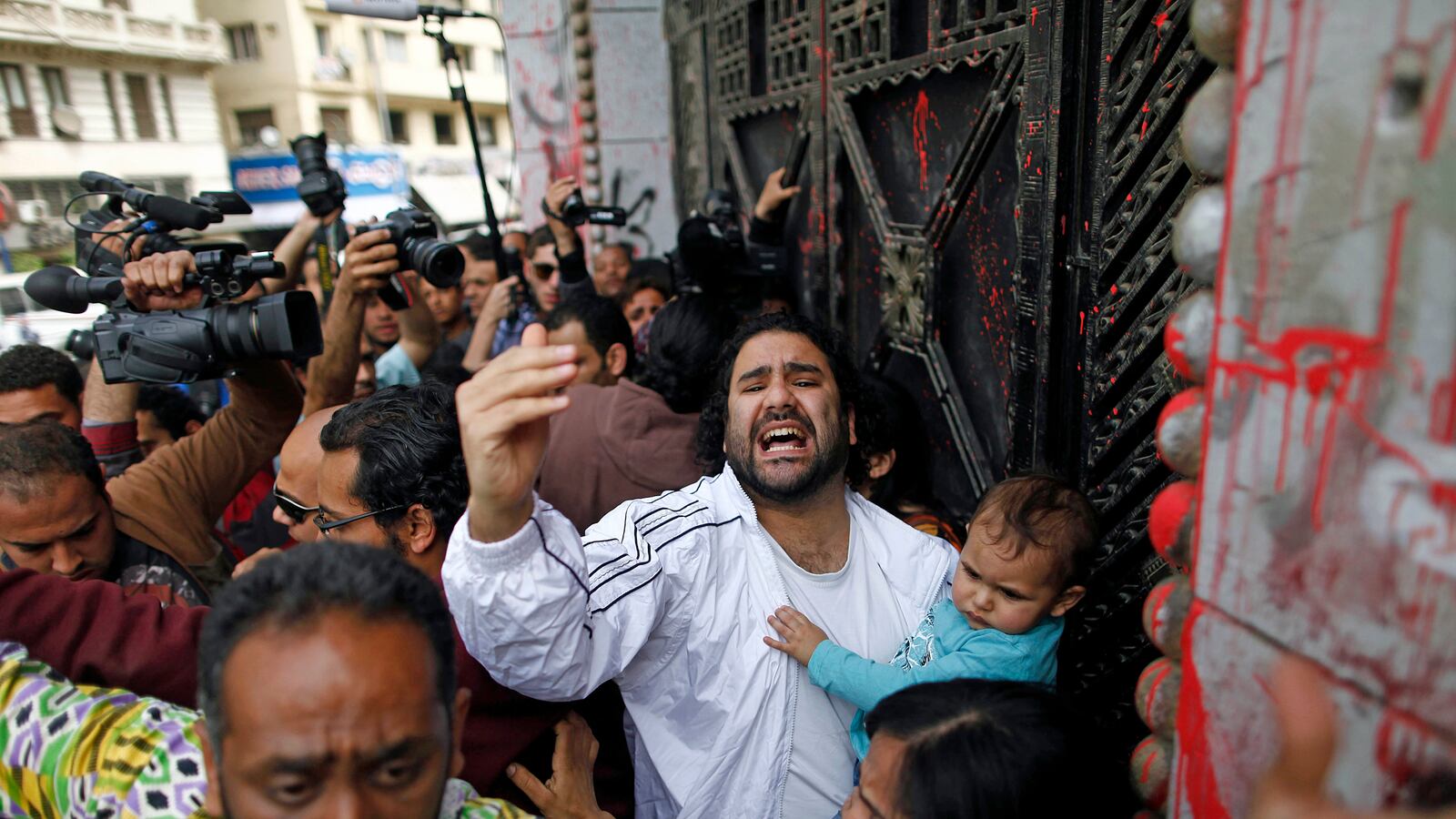Alaa Abdel Fattah, one of Egypt’s best-known bloggers and activists, was a political prisoner under former dictator Hosni Mubarak, and then again under the cadre of generals that took Mubarak’s place, becoming, during a two-month jail stint in late 2011, a symbol of the abuses of military rule. When Fattah heard that he was wanted for arrest yet again—this time, under the democratically elected president for whom he’d cast a ballot in June—he says he was not surprised. “I expected this would happen,” he says. “Whenever a regime is cornered, one of the first things it starts doing is arresting activists. And we seem to be preparing for a crackdown.”

Last week, Egypt’s public prosecutor created a firestorm when he issued a series of arrest warrants against prominent critics of the government. The warrants have been widely condemned as a move to stifle dissent against Egypt’s president, Mohamed Morsi, and his allies in the Muslim Brotherhood. The highest-profile target is comedian Bassem Youssef, whose wildly popular Daily Show–styled satirical talk show skewers Morsi regularly. Following a court appearance last week in which Youssef was charged with insulting both the president and Islam, even Jon Stewart came to his defense. “Without Bassem and all those journalists and bloggers and brave protesters who took to Tahrir Square to voice dissent, you, President Morsi, would not have been in a position to repress them,” Stewart said on his show Monday night.
The prosecutor, Talaat Ibrahim, whom Morsi appointed in December, is also reportedly investigating Youssef for “threatening public security.” In an interview with The Daily Beast earlier this year, as the possibility of legal action loomed, Youssef described the potential charges as “a way to pressure you and a way to exhaust you and a way to drain your energy”—adding that his best defense would be to keep up the satire. True to form, he approached the courthouse last week sporting an oversize black hat, in imitation of one recently worn by Morsi while receiving an honorary degree in Pakistan, as noted in The New York Times, and then mocked the proceedings on his Twitter feed.
The charges against Youssef have garnered international attention: they are the most glaring example yet of what rights advocates paint as a systematic squeeze on media freedom. But analysts say that cases against Fattah and other activists are potentially more worrisome—part of what Michael Wahid Hanna, a senior fellow at the Century Foundation, calls an “emerging pattern” in which the prosecutor’s office targets anti-Morsi activists. “It’s a very clear instance of the criminal-justice system being corrupted and manipulated for a [political] gain,” Hanna says. “Which is trying to chill dissent and intimidate activists.”
If little-known activists find themselves in legal trouble, Hanna adds, “they won’t be able to draw international attention to their plight.”
Many revolutionary activists, like Fattah, openly supported Morsi during the final round of last summer’s presidential election, helping him to a narrow victory over Ahmed Shafiq, a prime minister under Mubarak whom many considered a remnant of the old regime. Morsi and his allies, however, have become increasingly entrenched against the non-Islamist opposition—and protests have gripped the country since December, when Morsi temporarily granted himself authoritarian powers and used them to push through an Islamist-penned constitution, as well as appoint Ibrahim as prosecutor.
Shadi Hamid, the director of research at the Brookings Doha Center, says that the government now believes that “you’re either with the Brotherhood or against it”—and appears to be turning the prosecutor’s office on its opponents. In addition to Fattah, arrest warrants were issued for at least four other prominent activists last week. “The fact that activists with revolutionary credentials are being targeted, some of whom actually supported Morsi in elections, is very disturbing,” Hamid says. “If you talk to activists in Egypt right now, the perception is that if they publicly oppose Morsi and the Brotherhood, they could be next.”
After the warrants were issued last week, Fattah says, they were heavily promoted on state media, as well as on the government’s official Facebook page. He decided to turn himself in, he adds, because he feared the publicity could incite a backlash from Morsi’s supporters. “I freaked out,” he says. “Even the most dangerous criminals don’t hear their arrest warrants on the radio. It was scary. So I handed myself in.”

Fattah appeared in court last week decked in white clothes, to symbolize the outfit he wore during his imprisonment under military rule. Like the other activists, he was accused of inciting violence against the Brotherhood, in connection with a recent incident in which anti-Islamist crowds attacked the Brotherhood’s Cairo headquarters, sparking violent clashes with Morsi supporters. Human-rights advocates have dismissed the charges against Fattah and the others, calling them manufactured and politically motivated. “They are trying to stop this revolutionary wave, and the only thing they can think of is to put as many revolutionary voices behind bars as possible,” Fattah says.
Morsi’s government contends that it has played no role in the legal drama. But Hamid and others point out that the prosecutor has been accused of carrying out a political agenda since taking office last year. And while incitement to violence is a serious problem in Egypt, Hamid adds, the recent allegations against Fattah and the others “obviously seem political.”
Eric Trager, a fellow at the Washington Institute for Near East Policy, says the legal targeting of government opponents is likely to continue. “The Muslim Brotherhood believes that Egypt’s problems are due to a broad conspiracy against its rule,” he says. “It is therefore cracking down on its critics, rather than working to restore stability by including them in the political process.”
“The point in going after top activists like Alaa and top media figures like Bassem Youssef,” he adds, “is to make lesser-known activists and media figures afraid.”
But Fattah says that “policies of crackdown” have failed to quiet activists in the past. “It’s always the opposite,” he says.






